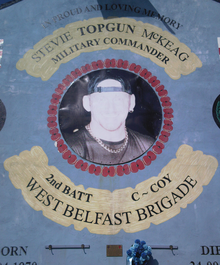Portal:Northern Ireland
|
The Northern Ireland Portal
Introduction  Northern Ireland (Irish: Tuaisceart Éireann [ˈt̪ˠuəʃcəɾˠt̪ˠ ˈeːɾʲən̪ˠ] ⓘ; Ulster Scots: Norlin Airlann) is a part of the United Kingdom in the north-east of the island of Ireland that is variously described as a country, province or region. Northern Ireland shares an open border to the south and west with the Republic of Ireland. At the 2021 census, its population was 1,903,175, making up around 3% of the UK's population and 27% of the population on the island of Ireland. The Northern Ireland Assembly, established by the Northern Ireland Act 1998, holds responsibility for a range of devolved policy matters, while other areas are reserved for the UK Government. The government of Northern Ireland cooperates with the government of Ireland in several areas under the terms of the Belfast Agreement. The Republic of Ireland also has a consultative role on non-devolved governmental matters through the British–Irish Governmental Conference (BIIG). Northern Ireland was created in 1921, when Ireland was partitioned by the Government of Ireland Act 1920, creating a devolved government for the six northeastern counties. As was intended by unionists and their supporters in Westminster, Northern Ireland had a unionist majority, who wanted to remain in the United Kingdom; they were generally the Protestant descendants of colonists from Britain. Meanwhile, the majority in Southern Ireland (which became the Irish Free State in 1922), and a significant minority in Northern Ireland, were Irish nationalists (generally Catholics) who wanted a united independent Ireland. Today, the former generally see themselves as British and the latter generally see themselves as Irish, while a Northern Irish or Ulster identity is claimed by a significant minority from all backgrounds. The creation of Northern Ireland was accompanied by violence both in defence of and against partition. During the conflict of 1920–22, the capital Belfast saw major communal violence, mainly between Protestant unionist and Catholic nationalist civilians. More than 500 were killed and more than 10,000 became refugees, mostly Catholics. For the next fifty years, Northern Ireland had an unbroken series of Unionist Party governments. There was informal mutual segregation by both communities, and the Unionist governments were accused of discrimination against the Irish nationalist and Catholic minority. In the late 1960s, a campaign to end discrimination against Catholics and nationalists was opposed by loyalists, who saw it as a republican front. This unrest sparked the Troubles, a thirty-year conflict involving republican and loyalist paramilitaries and state forces, which claimed over 3,500 lives and injured 50,000 others. The 1998 Good Friday Agreement was a major step in the peace process, including paramilitary disarmament and security normalisation, although sectarianism and segregation remain major social problems, and sporadic violence has continued. (Full article...) Selected article -
Carrickfergus (from Irish Carraig Fhearghais [ˌkaːɾˠəɟ ˈaɾˠɣəʃ], meaning "Fergus' rock") is a large town in County Antrim, Northern Ireland. It sits on the north shore of Belfast Lough, 11 miles (18 km) from Belfast. The town had a population of 28,141 at the 2021 Census. It is County Antrim's oldest town and one of the oldest towns in Ireland as a whole. Carrickfergus Castle, built in the late 12th century at the behest of Anglo-Norman knight John de Courcy, was the capital of the Earldom of Ulster. After the earldom's collapse, it remained the only English outpost in Ulster for the next four centuries. Carrickfergus was the administrative centre for Carrickfergus Borough Council, before this was amalgamated into the Mid and East Antrim District Council in 2015, and forms part of the Belfast Metropolitan Area. It is also a townland of 65 acres, a civil parish and a barony. (Full article...)
Selected picture -Northern Ireland listsRelated portalsSelected biography - Did you know (auto-generated) -
WikiProjectsThings you can do
TopicsCategoriesRecognized Content
Featured articlesGood articles
Featured listsAssociated WikimediaThe following Wikimedia Foundation sister projects provide more on this subject:
Northern Ireland on Wikipedia
Web resources
Discover Wikipedia using portals |










































